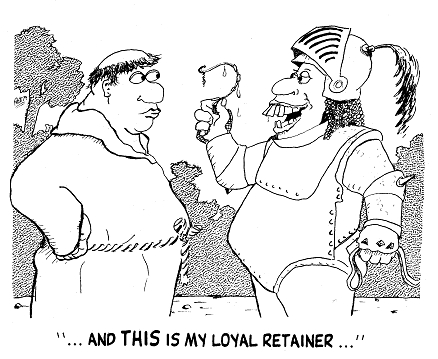

|
|
|
|
|
|
|
|
|
|
|
|
|
|
|
|
|
|
|
|
|
|
|
|
|
|
|
|
|
|
|
|
|
|
|
|
<make hyperlinked, EZ flowchart. do not change the math!>
Henchmen, whether male ||
female, are greatly desired by the discerning players,
for they usually spell the
difference between failure and success in the long term view.
They are useful in individual
adventures as a safety measure against the machinations of rival player
characters,
provide strength to the
character and his or her stronghold,
and lastly serve as a means
of adventuring when the player character is unable to.
Because they are so useful,
and because they are typically so devoted,
there are CHA
limitations as to how many henchmen a PC is able to attract.
Knowing this, the real question
for the DM is who will be attracted?
where will they be found?
when will they come?
and what will the cost be?
These questions are answered in detail hereafter.
Level
Of Prospective New Henchmen:
As a general rule, only
characters of 1st level of experience will be attracted to service with
a PC.
(If the NPC has already
gained a level or more of experience on his or her own, why would the {aegis}
of a PC be sought?!)
If the PC attempting to
find an NPC henchman is over 6th level,
there
is a 10% chance that the character found will be 2nd level, and seeking
service because of the renown of the PC;
if the PC is over 11th level,
there
is a 25% chance that NPC will be 3rd level,
25% chance
for 2nd level,
and 50%
for 1st level.
Race
Of Prospective Henchmen:
The locale
in which the NPC henchman is being sought, the racial
distribution in that locale,
the race of the prospective
liege, and the manner of seeking henchmen, will all bear upon the race
of any possible henchmen.
Locale
and Racial Distribution:
The amount of territory
within which the henchman is being sought is of importance,
for it determines what character
races are available for acquisition.
Determine racial percentages
that exist within the area, and group them into increments of 5%.
For example, a large city
of 25,000 might be 80% human, 10% half-orc,
and 10% "all others"
(dwarf,
elf,
gnome,
half-elf,
and halfling).
Racial
Specifications:
Unless special note is made
that only certain races of adventurers are desired,
or the notices &&
broadsides specifically exclude races,
the whole of the population
base will be eligible,
so random samplings will
be attracted.
Number
of Prospective Henchmen:
Human
&& half-orc characters suitable
for level advancement are found at a ratio of 1 in 100.
Other races have an incidence
of 1 in 50.
However, as most of these
characters will be other than low level adventurers and already in a situation
they are satisfied with --
and humans more so than
other races, unless the development of the area is primarily other than
human --
about 1 in 1,000 population
will be interested in offers of employment as a henchman.
NOTE: This figure must be
adjusted by the DM according to the locale,
for if it is an active adventuring
area, the incidence of prospective henchmen might be as great as 1 in 200,
while if it is a settled
and staid area, incidence might be as low as 1 in 5,000.
Effective Location of Henchmen:

While there might be as many
as 25 or
more prospective henchmen
in the city of 25,000 cited above, the PC desirous of locating one or more
for service must be able to
reach the NPCs
in order to let them know there is a henchman position
available. In order to get
this sort of information around, there are
several methods which can
be used singularly or in combination:
| Method | Cost | Effectiveness |
| POSTING NOTICES IN PUBLIC | 50 g.p. | 10%-40% |
| HIRING A CRIER | 10 g.p. | 1%-10% |
| HIRING AGENTS TO SEEK PROSPECTS | 300 g.p. | 20%-50% |
| FREQUENTING INNS && TAVERNS | special | special |
Each method can be tried
but once a month with any hope of success.
Reduce the percentage chance
of effectiveness of each method by 5% when used in combination;
this
reflects the duplication of effort.
[INNS && TAVERNS]
: The special costs for frequenting inns and taverns is a combination of
the price of a round of
drinks for the house and
a fee to the barkeep to
mention the prospective employer to adventurers.
For each 10
g.p. (50 g.p. maximum) of fee, there is a 1% - 4% chance of reaching
a henchman.
Up to ten establishments
can be so worked, but for each visited, the effectiveness
of the others is reduced
by 1%. Therefore, the PC had better
spend in excess of 20 gold
pieces in payments to innkeepers and barkeeps
if he or she is planning
to try this method in more than a few establishments.
Example:
The PC decides to try a media blitz to find a
henchman. He posts notices
and gets a 30% effectiveness, hires a crier
who is 3% effective, hires
agents who are 30% effective, and spends 500
g.p. in fees in inns ond
taverns to get an average 15% effectiveness after
overlap. The total coverage
is 30% + 3% + 30% + 15% = 78% -15%
(use of 3 methods beyond
the first ot -5% per method) = 63% final total
effectiveness. Assume 65%
of the total eligible NPC henchmen characters
will seek service. Whatever
final percentage figure is arrived at, this is
multiplied by the total
available non-player characters available as
henchmen. Use proportions
for racial types, unless the methods of informing
prospective NPCs neglected
some area where a specific race is
concentrated.
Length
Of Time Required For Responses:
It will take from 2 to 8
days for all prospective henchmen who are going to apply to locate the
PC and seek him or her out to apply for the job.
During this period of time,
the PC must remain in the place he or she made known as the spot to go
for employment.
Failure to do so will result
in a loss of any applicants coming that day and each day thereafter he
or she is not available.
When the total number of
applicants coming are known by you,
divide
this number by the number of days during which notice is getting around
(2-8),
and this
will give the number of applicants per day.
Always
have any odd numbers remaining come during the first or second day.
Classes
Of Prospective Henchmen:
Of the total number of prospective
characters who are capable of working upwards in level, the distribution
of class will be as follows:
| 20% | CLERICS (1st, 2nd, 3rd) | (d6, 1 = druid: 1st, 2nd, 3rd) |
| 44% | FIGHTERS (1st, 2nd, 3rd) | (d10, 1 = ranger: 1st, 2nd, 3rd, 2 = paladin: 1st, 2nd, 3rd) |
| 20% | MAGIC-USERS (1st, 2nd, 3rd) | (d6, 1 = illusionist: 1st, 2nd, 3rd) |
| 15% | THIEVES (1st, 2nd, 3rd) | (d6, 1 = assassin: 1st, 2nd, 3rd) |
| 1% | MONKS (1st, 2nd, 3rd) | - |
| Die roll | Character class |
| 01-10 | Cavalier (d6, 1 = paladin) |
| 11-30 | Cleric (d6, 1 = druid) |
| 31-65 | Fighter (d20, 1 = barbarian, 2 or 3 = ranger) |
| 66-85 | Magic-user (d6, 1 = illusionist) |
| 86-00 | Thief (d6, 1 = acrobat, 2 = assassin) |
Non-human characters located
will have [2] classes if they have scores of 14 or greater in [2] major
ability areas,
[3] classes if they have
ability scores of 14 or greater in [3] major areas which match up with
those of classes which they are able to work in simultaneously.
Exception: Those
races which can work only in two professions at once will not be exceptional,
and regardless of their ability scores they can work in only as many classes
as stated in the PLAYERS HANDBOOK. <?: which races would those be>
<above link correct?>
<link to PH table?>
<actual links to the
Rogues Gallery can be made here, perhaps in a 4th column, above>
Cost
Of Successful Employment:
In addition to the costs
of getting prospective henchmen to seek employment,
the PC desiring to hire
one or more of them must be prepared to make a substantial offer which
is comprised of the following considerations:
[A] Initial
Payment:
Not less than 100
g.p. per level of the applicant must be offered.
This will give a base 25%
interest in accepting the position.
For each additional 100
gold pieces,
interest
increases 10% to a maximum of 55%.
[B] Equipment:
The prospective henchman
must be provided with complete equipment according to his or her class
or classes.
Any magic items included
will make the character more interested in accepting the position,
assuming he or she can use
such items, of course.
For each magic item (exclude
arrows except in groups of 5), increase interest by 15%.
[C] Quarters
and Support:
The PC must offer reasonable
housing and promise free food &&
clothing as needed to the prospective henchman.
This simply adds 5% to interest
level when offered,
but failure to promise such
quarters and support will lower interest by 25%.
Activity
and Shares:
The PC must state what amount
of activity the prospective henchman will be given,
and what duties &&
position is envisioned for him or her.
Furthermore, the prospective
henchman must be told what share of treasure he or she can expect from
adventuring,
and what division of magic
items can be expected.
Characteristics
of Henchmen: The characteristics, including alignment,
of NPC applicants are discussed
under the section, PERSONAE OF NON-PLAYER CHARACTERS.
You, as DM, can decide how
best to reveal all of this information to the PC,
some by relating what is
"seen", some by actually playing the role of the applicant.
If the character asks specific
questions, remember that the applicant might take this amiss.
Acceptance
Of Employment:
When the basic level of
interest is found, and characteristics discovered,
roll [%] dice if the PC
states a desire to accept the applicant as a henchman.
Adding the PC's CHA reaction
adjustment to the interest level,
and if the dice score does
not exceed interest and charisma reaction adiustment,
the NPC accepts employment.
[
D = charisma reaction adjustment
A + B + C + D = E
E = % Chance of acceptance
]
?
<
D = standard reaction modifiers
(cha + aa + bb + cc + dd + ee + ff + gg + hh + ii + jj) <link to targets
@ dmg240, aka dmg36.lbm>
A + B + C + D = E
E = % Chance of acceptance
>
?
Equipment
Of Henchmen:
All henchmen will come with
nothing except the (normal) clothes they wear.
Although they will have
a few copper and silver coins, they will have nothing of value - no armor
or weapons, nothing!
Their wretched state is,
in fact, one of the prime motivations for their seeking employment with
a successful adventurer.
Exceptional Henchmen (Associates - OSRIC, page 136):

From time to time PCs will
manage to capture or otherwise have in their power characters of higher
than 2nd level.
This in itself is of no
consequence, but what if the player character then makes an offer of henchman
status to the other character!
1. If
the NPC is more than
[2] levels greater than the PC,
only associate status possibly
for but 1 adventure or undertaking,
perhaps for two,
will be accepted,
regardless of the amount
of inducement offered.
2. If
the NPC is from [2] levels lower to [2] levels greater
than the PC,
the NPC will consider only
offers of becoming a temporary hireling or an associate for 1-4 weeks or
adventures/undertakings.
3. If
the NPC is [3] or more levels [less
than] the level of the PC,
he or she will consider
the offer, but all of the normal requirements of offer and acceptance must
be handled as usual.
If the offer is forced (do
it or else you die, etc.), the loyalty of the henchman will be that of
a slave.
It will be that of captured
and enlisted unless a considerable sum of additional money or considerations
of magic are given.
Such exceptional henchmen
are the sole exception to the rule that henchmen come unequipped,
as they might well have
considerable goods.

ADQ: Can henchmen
and hirelings
advance in level while employed
by a
PC?
ADA: Yes, if they've
got the money and
the time. A benevolent employer
should allow the NPC to
take a leave of
absence for training, with
the condition
that they return afterwards
for continued
employment. Exceptionally
generous PCs may wish to
pay for part or all of the
training, with
a resultant increase to
loyalty.
(Polyhedron #12)
<BTB/RAW, hirelings don't
advance in levels>
ADQ: I have 2 M-U <henchmen>
and my DM will not allow me to pick
all of their spells before we go off on an
adventure. She insists that they take
things like Read Magick and Read Languages
when I want them to take
Charm Person and Magick Missile. Is
this fair?
ADA: All <henchmen> in the AD&D Game
system are not just slaves to their masters
every whim. They are unique individuals
with established character traits. Your
DM has determined that for some reason
your <henchmen> strongly desire to rely on
certain spells. This is proper within the
rules systems. It becomes your task to
determine what causes this and try to turn
it in a way that will become useful to you
and your adventure. Remember that you
can always get new <henchmen>.
(Polyhedron #15)
oldschooler wrote:
Two quick questions:
1. I've often read that henchmen are aquired with an offer of at least
100 gold pieces.
Is that to indicate an initial offer with shares taking care of the
rest, or does the average henchman expect to be paid 100 g.p. per adventure/week/month
or whatever?
How do you usually handle the whole "paying henchmen" thing?

Found and a share of loot after being paid to attract them is usual.
If their fellows are killed frequently, then the rewards had better
be sweet, or the henchmen will leave.
